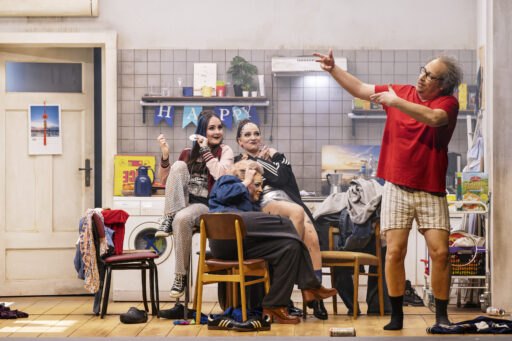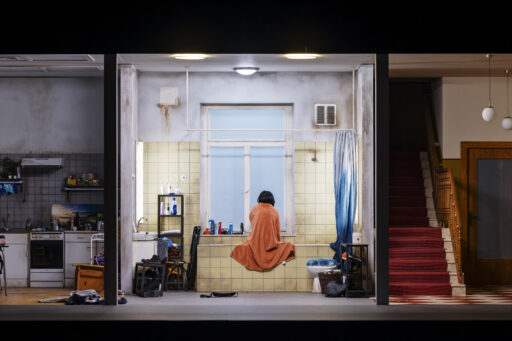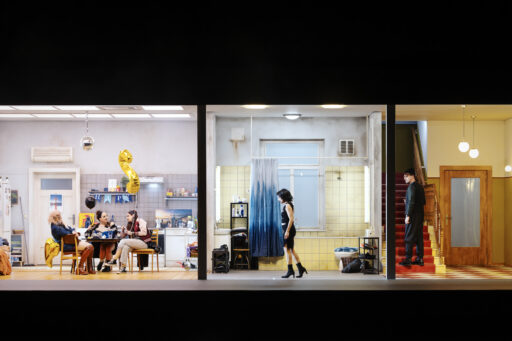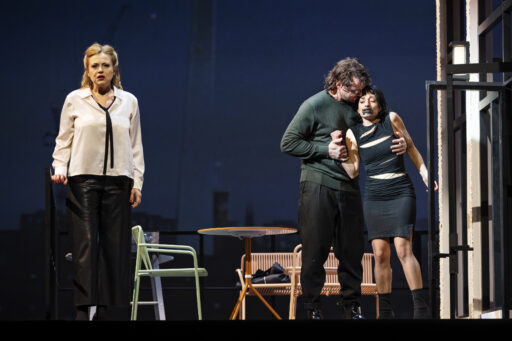Deutsche Staatsoper Berlin, season 2023/2024
“RUSALKA“
Lyrical Fairy-tale in three acts, libretto by Jaroslav Kvapil
Music by Antonin Dvořák
Rusalka CHRISTIANE KARG
The prince PAVEL ČERNOCH
The foreign princess ANNA SAMUIL
Vodník, the water goblin TUOMAS PURSIO/MIKA KARES
Ježibaba ANNA KISSJUDIT
Gamekeeper ADAM KUTNY
Kitchen boy CLARA NADESHDIN
First wood sprite REGINA KONCZ
Second wood sprite REBECKA WALLROTH
Third wood sprite EKATARINA CHAYKA-RUBINSTEIN
Hunter TAEHAN KIM
Staatskapelle Berlin & Staatsopernchor
Conductor Robin Ticciati
Chorus Gerhard Polifka
Director Kornél Mundruczó
Stage, costumes Monika Pormale
Light Felice Ross
Video Rudolfs Baltins
Choreography Candas Bas
Berlin, 11th February 2024
Rusalka by Antonin Dvořák from 1901, the most famous Czech opera, had been staged at the Deutsche Staatsoper Berlin only once in 1968 by Erhard Fischer, conducted by Arthur Apelt with the deserving Ingeborg Wenglor leading the premiere cast until Kornél Mundruczó’s new production on 4th February 2024. Probably knowing that staging fairytale opera is fraught with pitfalls, he transfers the plot from a romantic Bohemian landscape, picturesque lake and medieval castle  included, to three floors of an apartment building in Berlin in view of the TV tower. Vodník, the water goblin, is a sort of eternal student in his fifties who lives in a shared flat on the ground floor with the three wood sprites and Rusalka who prefers lying in the bathtub to partying with the others. The witch Ježibaba is a neighbour who is constantly throwing eels around. She visits Rusalka in the bathroom to make her change into a tight black party dress. Like that Rusalka is taken by another neighbour, the Prince, to his posh penthouse where he lives with the Foreign princess who he turns to again as soon as he cannot cope with Rusalka’s muteness any more. She returns to the bath, pulls her hair out to end up in the cellar as an eel with a long black tail. The final duet kills the neighbour and redeems her. Enough. The technically elaborate stage by Monika Pormale is visually most striking. Mundruczó’s attempt to stage a social drama rather than a fairytale leaves the singers alone as characters, and unlike in other
included, to three floors of an apartment building in Berlin in view of the TV tower. Vodník, the water goblin, is a sort of eternal student in his fifties who lives in a shared flat on the ground floor with the three wood sprites and Rusalka who prefers lying in the bathtub to partying with the others. The witch Ježibaba is a neighbour who is constantly throwing eels around. She visits Rusalka in the bathroom to make her change into a tight black party dress. Like that Rusalka is taken by another neighbour, the Prince, to his posh penthouse where he lives with the Foreign princess who he turns to again as soon as he cannot cope with Rusalka’s muteness any more. She returns to the bath, pulls her hair out to end up in the cellar as an eel with a long black tail. The final duet kills the neighbour and redeems her. Enough. The technically elaborate stage by Monika Pormale is visually most striking. Mundruczó’s attempt to stage a social drama rather than a fairytale leaves the singers alone as characters, and unlike in other productions, the audience feels like they are in a fantastic comedy or a horror film. Conductor Robin Ticciati seems to adore the music and makes the Staatskapelle Berlin play Dvořák’s score vividly with a touch of modernity by evoking moments of both impressionism and verismo. He is inclined to linger a little too long and he sometimes fails to balance the orchestra and the voices so that the singers are drowned, above all Rusalka. Christiane Karg’s light Mozart soprano can hardly manage the dramatic requirements. She throws herself into the title role by acting intensely, including the Salome-like dance during the Polonaise of act 2, which cannot outweigh the lacking corpo in the middle of her register and hard sounding upper notes that tend to an unpleasant vibrato. Pavel Černoch is an
productions, the audience feels like they are in a fantastic comedy or a horror film. Conductor Robin Ticciati seems to adore the music and makes the Staatskapelle Berlin play Dvořák’s score vividly with a touch of modernity by evoking moments of both impressionism and verismo. He is inclined to linger a little too long and he sometimes fails to balance the orchestra and the voices so that the singers are drowned, above all Rusalka. Christiane Karg’s light Mozart soprano can hardly manage the dramatic requirements. She throws herself into the title role by acting intensely, including the Salome-like dance during the Polonaise of act 2, which cannot outweigh the lacking corpo in the middle of her register and hard sounding upper notes that tend to an unpleasant vibrato. Pavel Černoch is an  idiomatic Prince whose tenor does not sound typically Czech with its baritone-like timbre and amazing legato but he turns out to be perfectly cast for the taxing part of Wagnerian strength in the ardent declaration of love at the end of act 1. Both social characters seem to be weak in Mundruczó’s drama, Rusalka is restlessly pushed around and the Prince comes along as a middle-class person. Tuomas Pursio sings the Vodník from the side instead of Mika Kares who is only able to act because of an incurred bronchitis. Tuomas Pursio sings beautifully with soaring power up top to make a vocal highlight out of the aria in act 2. Also neglected by the director as a character, Mika Kares shows little authority and plays something between a flatmate and a fatherly friend. Anna Kissjudit’s impressivley big contralto struggles with the higher middle register of the witch neighbour
idiomatic Prince whose tenor does not sound typically Czech with its baritone-like timbre and amazing legato but he turns out to be perfectly cast for the taxing part of Wagnerian strength in the ardent declaration of love at the end of act 1. Both social characters seem to be weak in Mundruczó’s drama, Rusalka is restlessly pushed around and the Prince comes along as a middle-class person. Tuomas Pursio sings the Vodník from the side instead of Mika Kares who is only able to act because of an incurred bronchitis. Tuomas Pursio sings beautifully with soaring power up top to make a vocal highlight out of the aria in act 2. Also neglected by the director as a character, Mika Kares shows little authority and plays something between a flatmate and a fatherly friend. Anna Kissjudit’s impressivley big contralto struggles with the higher middle register of the witch neighbour Ježibaba. Anna Samuil brings Wagnerian heft to her frantic Foreign princess by sound volume which nearly turns into Sprechgesang for lower notes. Adam Kutny is strong as the Gamekeeper but Clara Nadeshdin’s soprano suffers a little from the low tessitura of the female Kitchen boy. The production is blessed by Regina Koncz, Rebecka Wallroth and Ekaterina Chayka-Rubinstein as a vivid trio of Wood sprites who, along with the Vodník, turn into alien monsters in act 3. This production presents Rusalka as a sequence of exclusively ugly pictures, sad and desperate moments and as a last impression, there is an ugly, eternal curse. Death really seems the best solution for such terrible being. It can be staged differently, which is proved by other productions.Photos by Gianmarco Bresadola
Ježibaba. Anna Samuil brings Wagnerian heft to her frantic Foreign princess by sound volume which nearly turns into Sprechgesang for lower notes. Adam Kutny is strong as the Gamekeeper but Clara Nadeshdin’s soprano suffers a little from the low tessitura of the female Kitchen boy. The production is blessed by Regina Koncz, Rebecka Wallroth and Ekaterina Chayka-Rubinstein as a vivid trio of Wood sprites who, along with the Vodník, turn into alien monsters in act 3. This production presents Rusalka as a sequence of exclusively ugly pictures, sad and desperate moments and as a last impression, there is an ugly, eternal curse. Death really seems the best solution for such terrible being. It can be staged differently, which is proved by other productions.Photos by Gianmarco Bresadola
Deutsche Staatsoper Berlin: “Rusalka”
